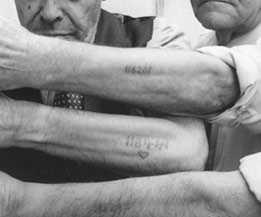 Holocaust Survivors from Salonica
Holocaust Survivors from SalonicaA poem by Yitzhak Katznelson, which was written a few days before the Germans killed him, and it seems to be appropriate even today.
Sure enough, the nations did not interfere, nor did they protest,Nor shake their heads, nor did they warn the murderers.Never a murmur. It was as if the leaders of the nationsWere afraid that the killings might stop.
The House by the Sea: A Portrait of the Holocaust in Greece.
There are far too few books in English on the Sephardic experience in the Holocaust. There would be fewer still if it weren't for Rebecca Camhi Fromer, author of the groundbreaking The Holocaust Odyssey of Daniel Bennahmias, Sonderkommando (University of Alabama Press, 1993) and co-author, with Rene Molho, of They Say Diamonds Don't Burn (Judah Magnes Museum, 1994). In her latest book, The House by the Sea, she weaves the facts of the Holocaust in Greece around the personal story of Salonica native Elias Aelion. Elias is not a Holocaust survivor in the usual sense, for he was never in a German concentration camp. There are no descriptions here of concentration camps, mass murders, or crematoria. Yet the book is subtitled "A Portrait of the Holocaust in Greece" because, as the author says in the Preface, this is "a serious work that is grounded in the past, the tenor of the struggle to survive, and the nature of the loss in Greece due to the Holocaust."
Elias Aelion was born in the house at the edge of the sea, a house which remains associated in his memory with "all that seemed worthwhile, warm and loving, simple and natural" His grandparents lived there, and it was the focal location of the very large family's life, of gatherings on Sabbaths, holidays and special occasions, of games and fights with cousins, and of other mundane events of a normal life. Elias was inducted into the Greek army in 1939, becoming part of the defense army against the invading Italians in 1940. When the Germans invaded in April, 1941, the Greek soldiers fled in disarray, and Elias escaped on foot with his comrades, walking for about 300 miles from somewhere between Bulgaria and Yugoslavia into Greece. When his family and friends and all the other Jews of his hometown went on the infamous "transports", he was in Italian-occupied Athens. Returning to Salonica, he finds his community and family gone.
Besides lending her own poetic eloquence to Elias's language (the story is told in the first person by Elias), Ms. Fromer also speaks to readers directly in the Introduction, the notes, the Appendices and the Afterword, in order to to create a complete picture of the events. In the Introduction, she presents a general historical background of the Jews of Greece, the culture of the Jews of Salonica (the city that "was a main center of Sephardic life, not a mere outpost of Jewish survival"), and the destruction of their great culture within a period of less than five months, culminating with the nineteenth and last transport out of Salonica on August 18, 1943. Alongside Elias's story, Ms. Fromer adds illuminating and interesting side notes. (One of the notes, however, gives the wrong information on the origin of the term "sefer tasin" - a portable food pot. The term has nothing to do with the Hebrew "sefer", meaning book, as is indicated, but comes from "sefer tasi" in Turkish - "sefer" meaning journey or expedition, related to the English word "safari".) The Ladino proverbs (with English translations) that introduce each chapter are not only appropriate preludes to the upcoming themes, but also hint at the richness of the language and the philosophy of life of the Sephardim obliterated in the Holocaust.
The Appendices include a historical time-line, a chronology of the Holocaust in Greece, a map, and archival information on the transports. One of the documents, from the O.S.S. (Office of Strategic Services), declassified only in January of 1998 and published here for the first time, dispels any doubt that at least by 1943, the Allies had clear information about the planned extermination of the Jews of Europe.
The House by the Sea is an engagingly-told piece of little-known history, and an intimate look at the destruction of a great and vibrant Sephardic culture. If we are to understand the full scope of the Holocaust, this history must be known, and that culture must be understood.


No comments:
Post a Comment